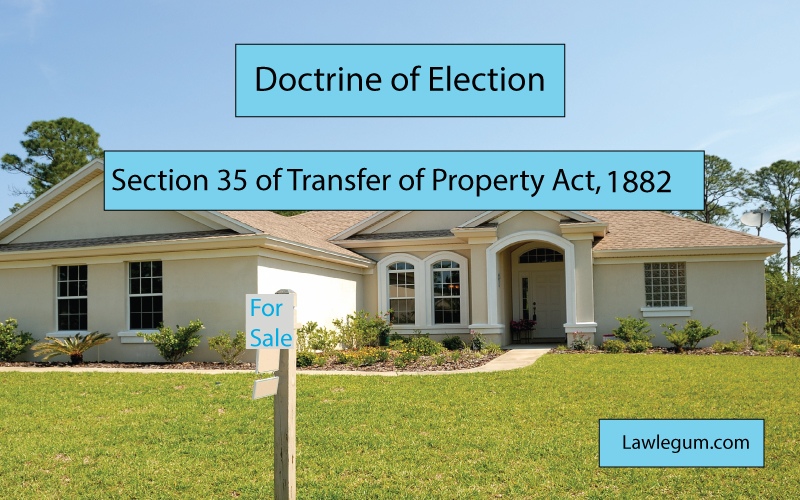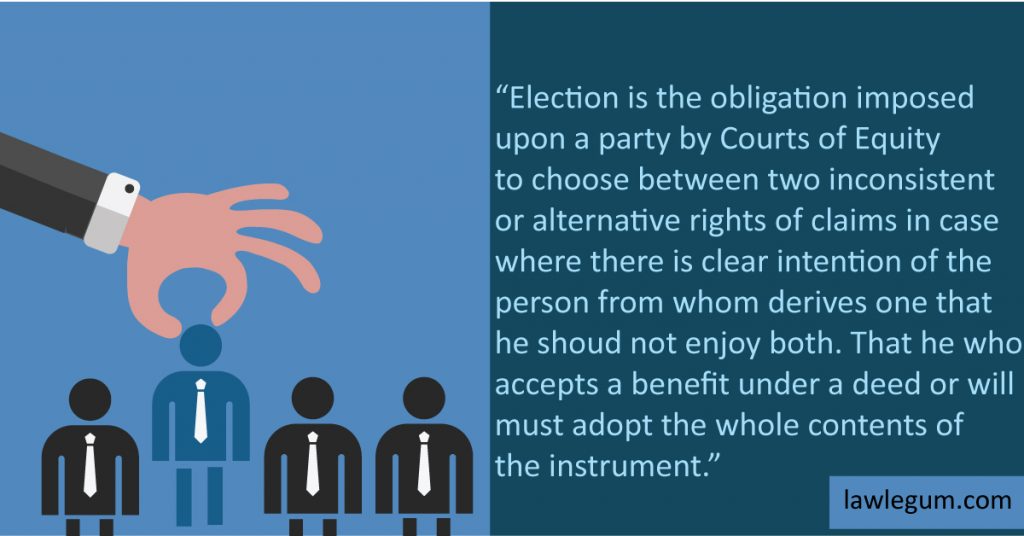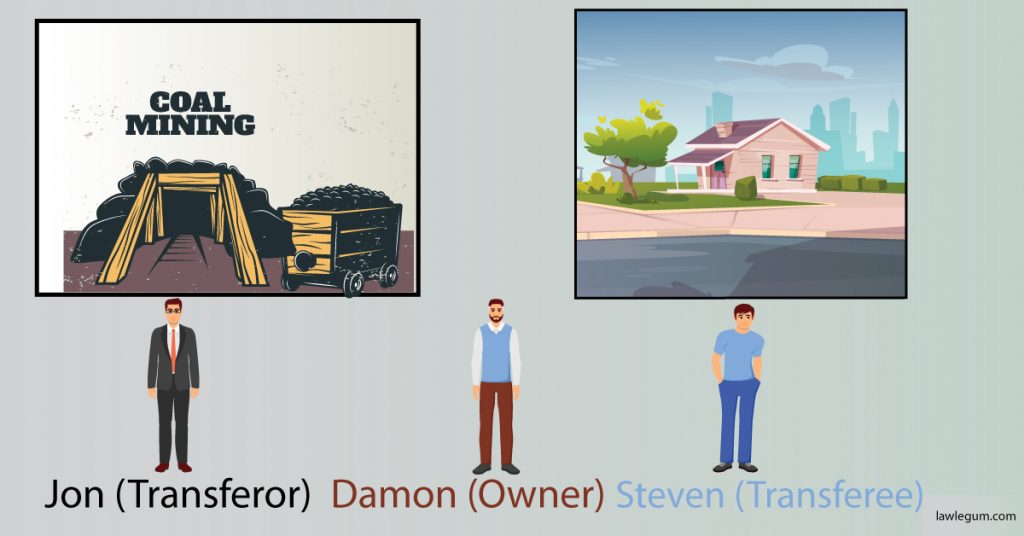In this article we will discuss section 35 of the Transfer of Property Act, 1882. We will elaborately explain the doctrine of election, essential conditions for the applicability of doctrine of election, modes of election, effects of election against the transfer, claim for compensation by the disappointed transferee and presumption of election with relevant case references and illustrations.
What is doctrine of election?
In simple words, election is a process that puts a person in a situation where he has to choose between two alternative rights or two inconsistent rights. Doctrine of election is a common law principle of equity that requires that a person is under an obligation to elect or choose between two inconsistent and alternative rights in the event where there is an ‘apparent intent’ of the grantor that the grantee should not enjoy both. Doctrine of election is incorporated under section 35 of the Transfer of Property Act, 1882.
According to White and Tudor’s Leading case in Equity,
According to doctrine of election, if a benefit is conferred upon a person under an instrument, that person must also bear the burden. A person cannot take what’s beneficial to him and disapprove to that which is against him under the same instrument.
In the classic words of Mainland, “He/she who approves a benefit under a deed/will or the other instrument, must-
- Accept the contents of the instrument completely;
- Obey to all its provision;
- Relinquish all rights or interests that are inconsistent with it.”
Illustration: By a deed X (transferor) gives to Y (transferee) a farmhouse belonging to Z (owner), and by the same deed gives a factory belonging to himself (X) to Z. Now, Z is put to election that means Z has to choose whether he wants to take the factory of X by giving his farmhouse to Y or not. In this case, Z is entitled to X’s factory only when he conforms to all the provisions of the deed by renouncing his rights in the farmhouse and by giving it to Y.
What are the principles underlying the doctrine of election?
The Latin maxim “quod approbo non reprobo” means that ‘no one can approbate and reprobate.’ In other words, a person cannot accept a thing and reject another in the same instrument. This maxim is one of the underlying principles of doctrine of election. The Courts of Equity in England followed the legal maxim ‘Allegans contraria non est audiendus’ which means ‘he is not to be heard who alleges things contradictory to each other.’ For the first time, doctrine of election was elaborately explained by Lord Hather in the case of Cooper v Cooper [1874] –
“There is an obligation on him who takes a benefit under an instrument to give full effect to that instrument under which it was beyond the power of the donor or settlor to dispose of, but to which effect can be given by the concurrence of him who receives the benefit under the same instrument, the law will impose on him who takes the benefit, the obligation of carrying the instrument into full and complete force and effect.”
An election will be binding if the person entitled to elect has the full knowledge of the rights and interests. Election can be made but once. If two remedies are open and a person takes one and fails, he cannot turn around and adopt the other.
Illustration: If a mortgagee (x) obtains a decree for rent and allows it to be barred, he cannot rely on the charge for the same.
What are the essential conditions for the applicability of the doctrine of election?
In the case of Mst. Dhanpatti v Devi Prasad and others [1970] the essential conditions for the doctrine of election were observed by the court.
The essential conditions for the applicability of the doctrine of election are as follows:
- The transferor must profess to transfer a property which he has no right to transfer;
- The transferor must confer a benefit on the owner whose property he intends to transfer to another person;
- The transfer and the conferring of benefit must constitute parts of the same transaction;
- The benefit must be directly conferred on the owner of the property;
- The benefit must be conferred on him in the same capacity in which he is the owner of the property;
The second paragraph of section 35 states that it is immaterial whether the transferor at the time of transfer of property knows or does not know it to be his own property.
Illustration: By a deed, A transfers 5 acres of land to B which A will get through partition in the future. B in return gives A Rs. 2 lacs in advance. In the present time that 5 acres of land belongs to A’s father and A does not own the property yet. Now, A’s father is put to an election whether he wants to keep the Rs. 2 lacs and give the land to B or not. Whether A does or does not believe that which he professes to transfer to be his own is immaterial.
What are the effects of election against the transfer?
If the owner gives disapproval to transfer of his property –
- He must renounce the benefits confer on him;
- The benefit intended for him would revert back to the transferor or his legal representatives.
In what cases the disappointed transferee can claim compensation?
The doctrine of election is based on the principle of compensation and not of forfeiture. In the following cases the disappointed transferee has a claim for compensation:
- Where the transfer is gratuitous;
- Where the transferor has before the transfer of property died;
- Where the transferor has before the transfer of property become incapable of making a fresh transfer;
- Where in the all cases the transfer of property is for consideration.
In the first three cases the case is closely similar to will and in the last case the matter is one of contract and the transferee has a consequent claim for compensation.
Where the elector has preferred to retain his own property and declined to accept the benefit conferred upon him, the benefit shall return back to the transferor and if the transferor dies, his legal representatives will get the benefit back.
What is the quantum of compensation claimed by the disappointed transferee?
According to section 35 of TPA, 1882 in the above mentioned four cases where the disappointed transferee has a claim for compensation, the quantum of compensation is the amount or the value of the property attempted to be transferred to the disappointed transferee.
Illustration: The coalmine is the property of Mr. Damon (owner) and worth Rs. 1000. Mr. Jon (transferor) by an instrument of gift professes to transfer it to Mr. Steven (transferee), giving by the same instrument Rs. 1200 to Mr. Damon. Mr. Damon elects to retain the coalmine. He forfeits the gift of Rs. 1200.
In the same case, Mr. Jon dies before the election. His representative must out of the Rs. 1200 pay Rs. 1000 (value of the coalmine) to Mr. Steven who is the disappointed transferee.
Who doesn’t need to elect?
- The third paragraph of section 35 of the Transfer of Property Act, 1882 states that ‘A person taking a benefit indirectly under a transaction need not to elect.’
- Different Capacities: The fourth paragraph of section 35 of the Transfer of Property Act, 1882 talks about different capacities. Where a person takes a benefit in one capacity and asserts his right in another, no question of election arises.
Where election is limited to part of a benefit
The general rule is that ‘if a person elects against the instrument, he will forfeit the whole of the benefit received under it.’ The fifth paragraph of section 35 provides an exception to this general rule. This paragraph states that –
‘If the owner elects to retain his property, he must relinquish the particular benefit that is conferred upon him in lieu of the property but he is not bound to relinquish any other benefit that is conferred upon him under the same transaction.’
Illustration: The estate of Birmingham is settled on X for life, and after his death upon Y. X leaves the estate of Birmingham to Z and Rs. 20,000 to Y, and Rs. 10,000 to W who is Y’s only child. Now if Y elects to retain the estate, he must relinquish Rs. 20,000 that was given to him in lieu of the estate. But Y does not have to relinquish Rs. 10,000 because it was not given in lieu of the estate.
What are the modes of election?
The paragraphs of section 35 of TPA, 1882 provide two modes of election.
- Election may be expressed;
- Election may be implied by conduct.
In the first mode where election is made in express words, it is final and conclusive. In the second mode where election is made impliedly by conduct, there are presumptions as election.
Presumption as Election:
Whether the benefit conferred on the owner (elector) was accepted with the knowledge of the circumstances is a question of fact subject to the following rules:
- If the elector has been enjoying the benefit conferred on him for two years without doing any act to express dissent, it shall be presumed that he was aware and had the knowledge or he waived the inquiry.
- If the elector has done any act which renders it impossible to place the person interested in the property professed to be transferred in the same condition as if such act had not been done.
- If an election has not taken place by the elector, the transferor may compel the elector to make his election. If the elector fails to comply with this requisition within a reasonable time, he shall be deemed to have elected to confirm the transaction.
- If the elector suffers from some disabilities such as lunacy, infancy etc then the election shall be postponed until the disability ceases to exist or until the election is done by some competent authority.
Illustration: In the picture attached-above if Mr. Jon (transferor) transfers to Mr. Steven (transferee) an estate to which Mr. Damon (owner) is entitled and as part of the same transaction gives Mr. Damon (owner) a coal mine. Mr. Damon takes possession of the mine and exhausts it. He has confirmed the transfer of the estate to Mr. Steven (transferee).
Case References for Doctrine of Election
Paramada Dasi v Lakhi Narain Mitter [1885] ILR 12 Cal 60
In this case the plaintiff brought a suit in 1873 to enforce her claim for maintenance against the ancestral property. In the present case the court held that, the plaintiff clearly made her election and she elected to have maintenance from the property then the property was devised to her nephew. She must have known that this maintenance was provided to her instead of her ancestral property. So now, in the present case she can not claim to recover the ancestral property which is sold to the defendant.
Muhammad Kader Ali Fakir v Fakir Lakman Hakim [1956] PLR Dacca 370
If an instrument is invalid in part, what remains is sufficient to put a person to his election if he claims a benefit under the instrument.
Ramakottaya v Viraghavayya [1929] AIR Mad 502
A person can not approbate and reprobate under the same transaction.
These were all about doctrine of election. Hope you like it. You can checkout our other blogs/articles related to Transfer of Property. Click here to read.
- What is Mens Rea and Actus Reus - February 13, 2024
- Case Summary of Anglo Norwegian Fisheries Case | United Kingdom V Norway - April 7, 2023
- What is a Solicitor? How to Become One - January 9, 2023



